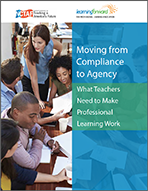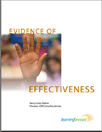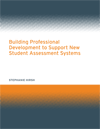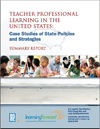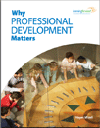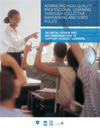
Learning Forward
Learning Forward is the only professional association devoted exclusively to those who work in educator professional development. We help our members plan, implement, and measure high-quality professional learning so they can achieve success with their systems, schools, and students.
All Articles
-
Moving from Compliance to Agency: What Teachers Need to Make Professional Learning Work
Teacher Agency Learning Forward and the National Commission on Teaching & America’s Future interviewed teachers and school administrators to understand the disconnect between the professional learning that teachers need and want and what they actually experience on the job. Teacher agency emerged as a factor that needs to be elevated in the […] -
Evidence of Effectiveness
Explore the impact of Learning Forward's work. The organization has accumulated a body of evidence that its programs and services are linked to improved professional development policy and practice at state, district, and school levels. The organization also has found evidence that implementing these policies and practices can lead to […] -
Building Professional Development to Support New Student Assessment Systems
Authored by Stephanie Hirsh, this white paper for Arabella Philanthropic Advisors is one of several on school reform topics by noted authors. New assessment systems will provide teachers with significant new opportunities to guide all students toward college and career readiness. To benefit from such assessments, states will need to […] -
Phase IV: Building a Learning Community: A Tale of Two Schools
In an effort to understand and document the elements that make professional learning communities effective, a new report presents case studies of two schools drawn from survey data of 33 New Jersey public schools involved in a state-sponsored professional learning community training program. The report, Building a Learning Community: A […] -
Phase III: Teacher Professional Learning in the United States: Case Studies of State Policies and Strategies
Policy shapes practices, and the increasingly important realm of professional development is no exception. To identify effective professional development policies and strategies, the Stanford University research team examined the policy frameworks supporting high levels of professional development activity in four states in Phase III of the multiyear research study. The […] -
Phase II: Professional Development in the United States: Trends and Challenges
The report from Phase II of this multiyear research initiative examines the status of professional learning in the United States. The findings indicate that the nation is making some progress in providing increased support and mentoring for new teachers. However, the study also reveals that teachers’ opportunities for the kind […] -
Phase I: Professional Learning in the Learning Profession
In 2009, NSDC released Professional Learning in the Learning Profession: A Status Report on Teacher Development in the United States and Abroad. This report examines what research has revealed about professional learning that improves teachers’ practice and student learning. The report describes the availability of such opportunities in the United […] -
Status of Professional Learning
Launched in 2008 by NSDC and a team of researchers from the Stanford Center for Opportunity Policy in Education (SCOPE), the three-part Status of Professional Learning research study aims to measure the effectiveness of professional learning in the United States. Funding for the multiyear research effort comes from the Bill […] -
Why Professional Development Matters
Written for parents, community members, and policy makers by Learning Forward's senior distinguished fellow, this booklet explains in fundamental terms what professional development is and why it is an important school improvement strategy. This series of Q-and-As is useful for helping audiences outside of education to understand this critical topic. […] -
Advancing High-Quality Professional Learning through Collective Bargaining and State Policy
Through collective bargaining agreements and state policies, local school districts and states establish the conditions, resources, and processes for professional learning that strengthen teaching and student learning. Learning Forward, the American Federation of Teachers (AFT), the Council of Chief State School Officers (CCSSO), and the National Education Association (NEA) formed […]

